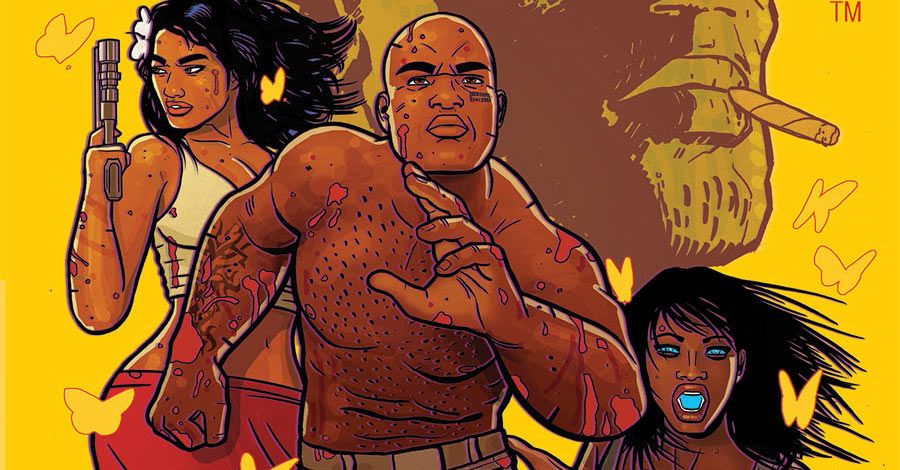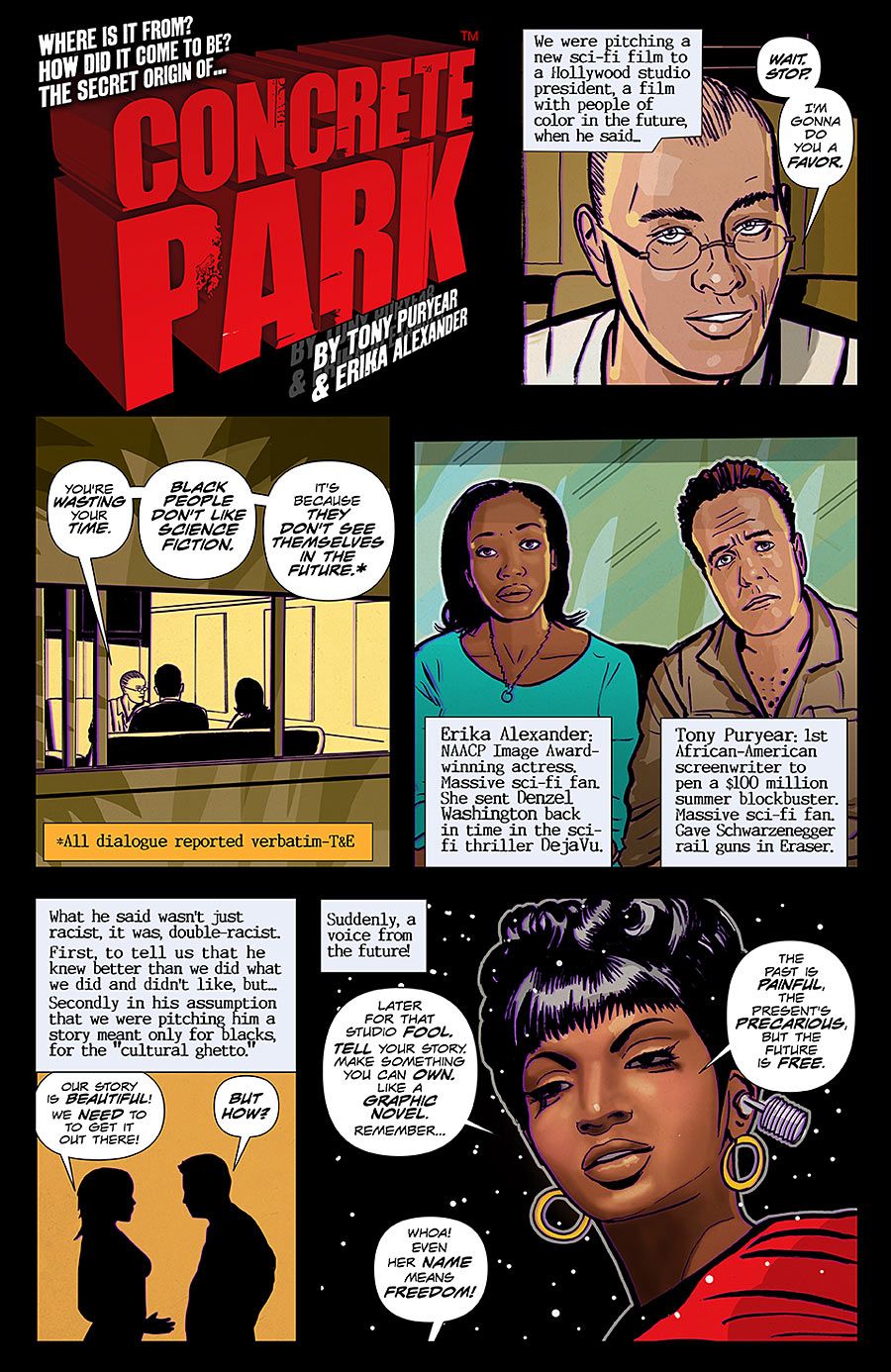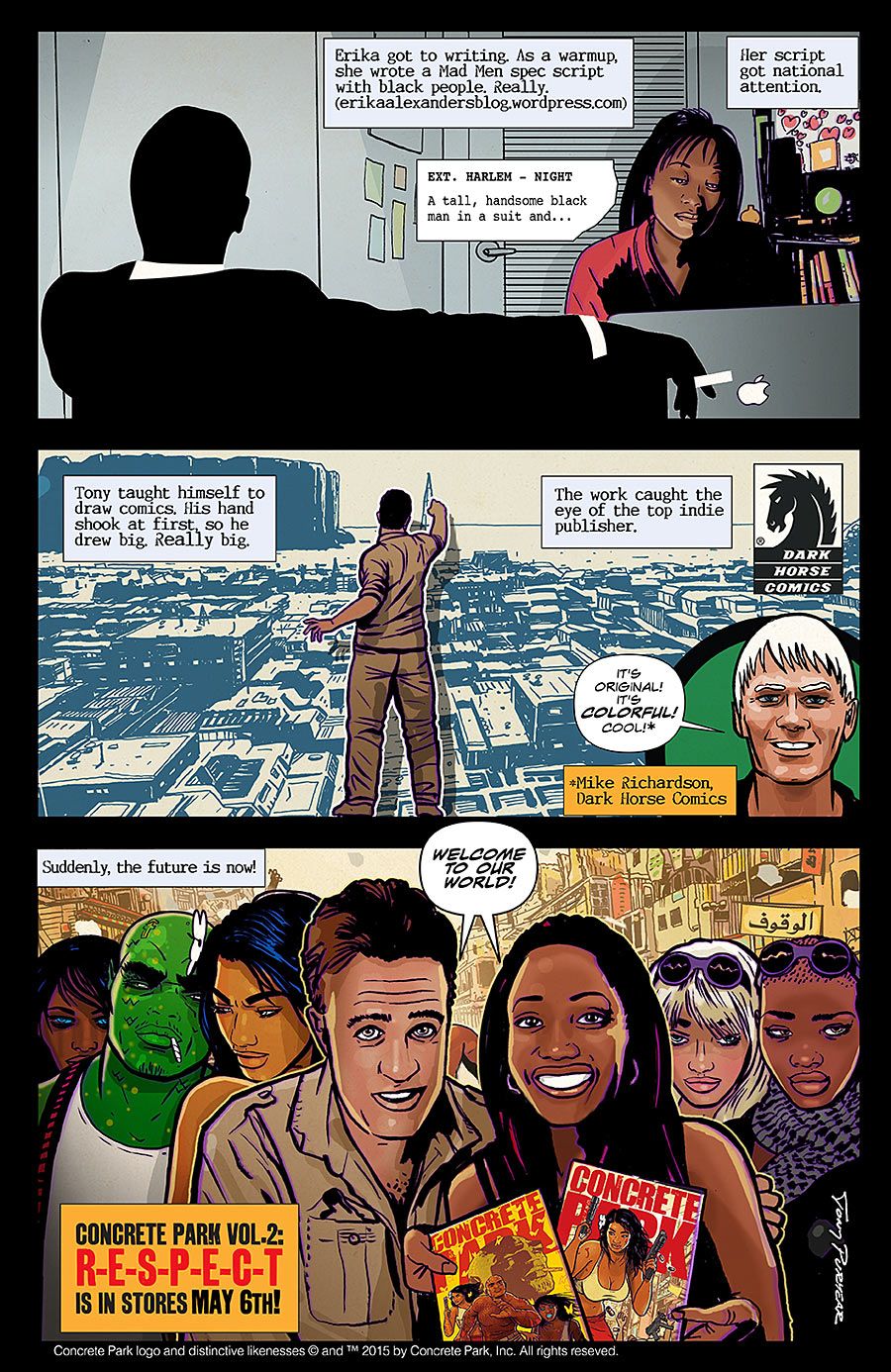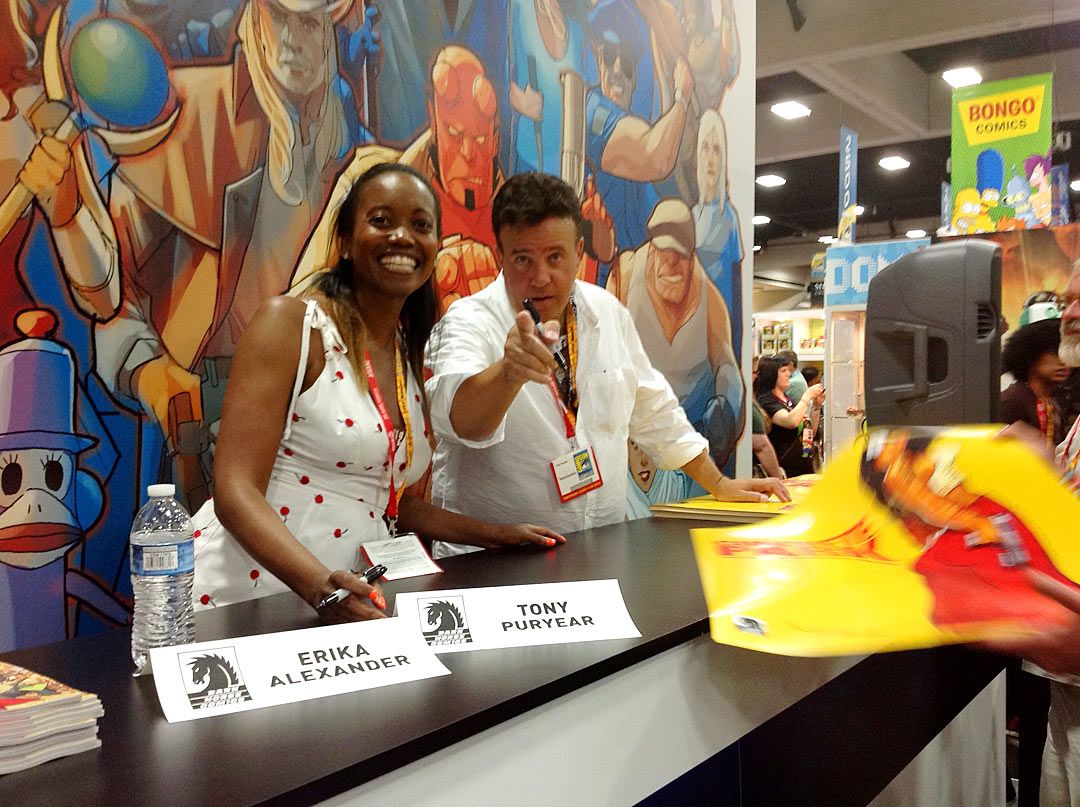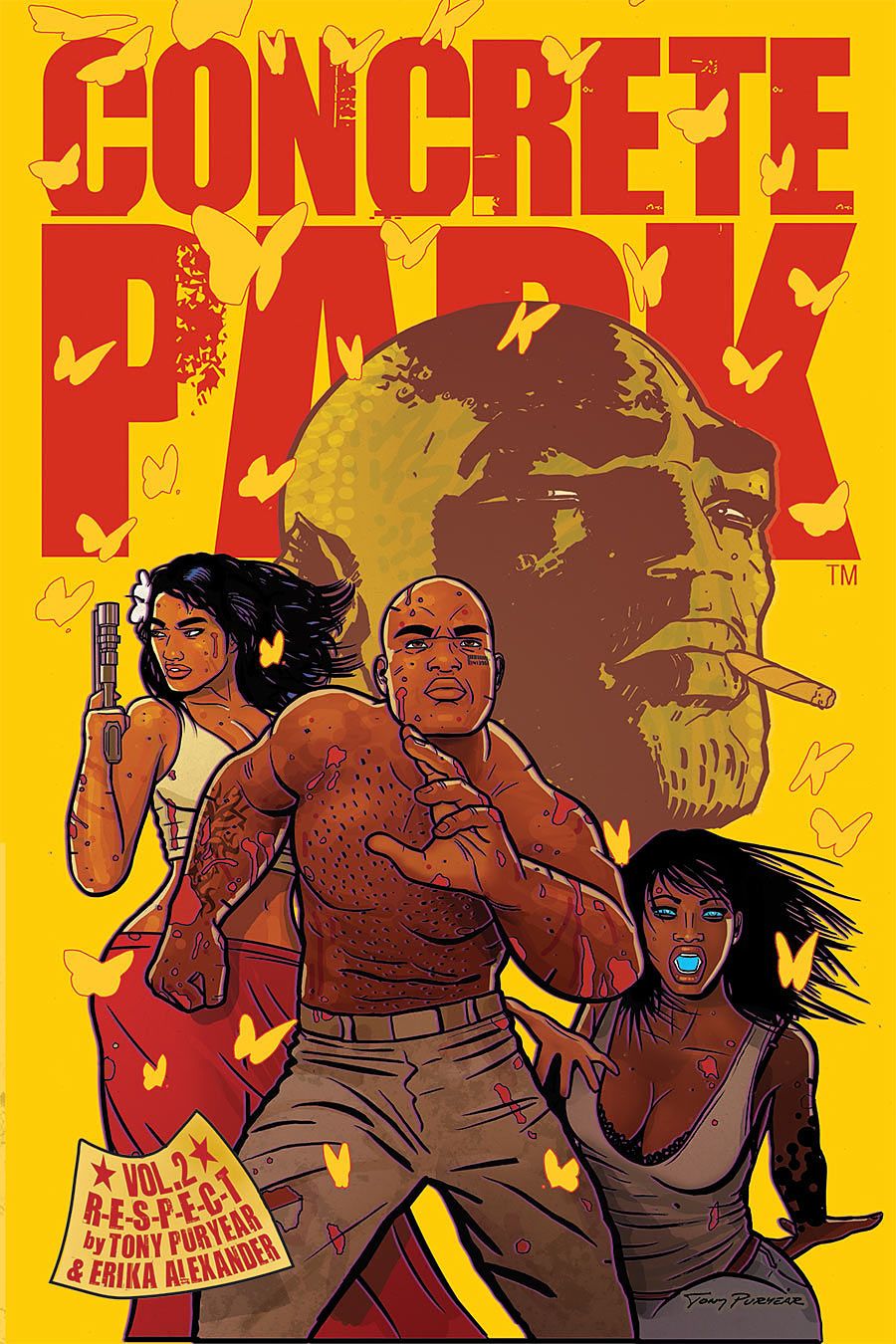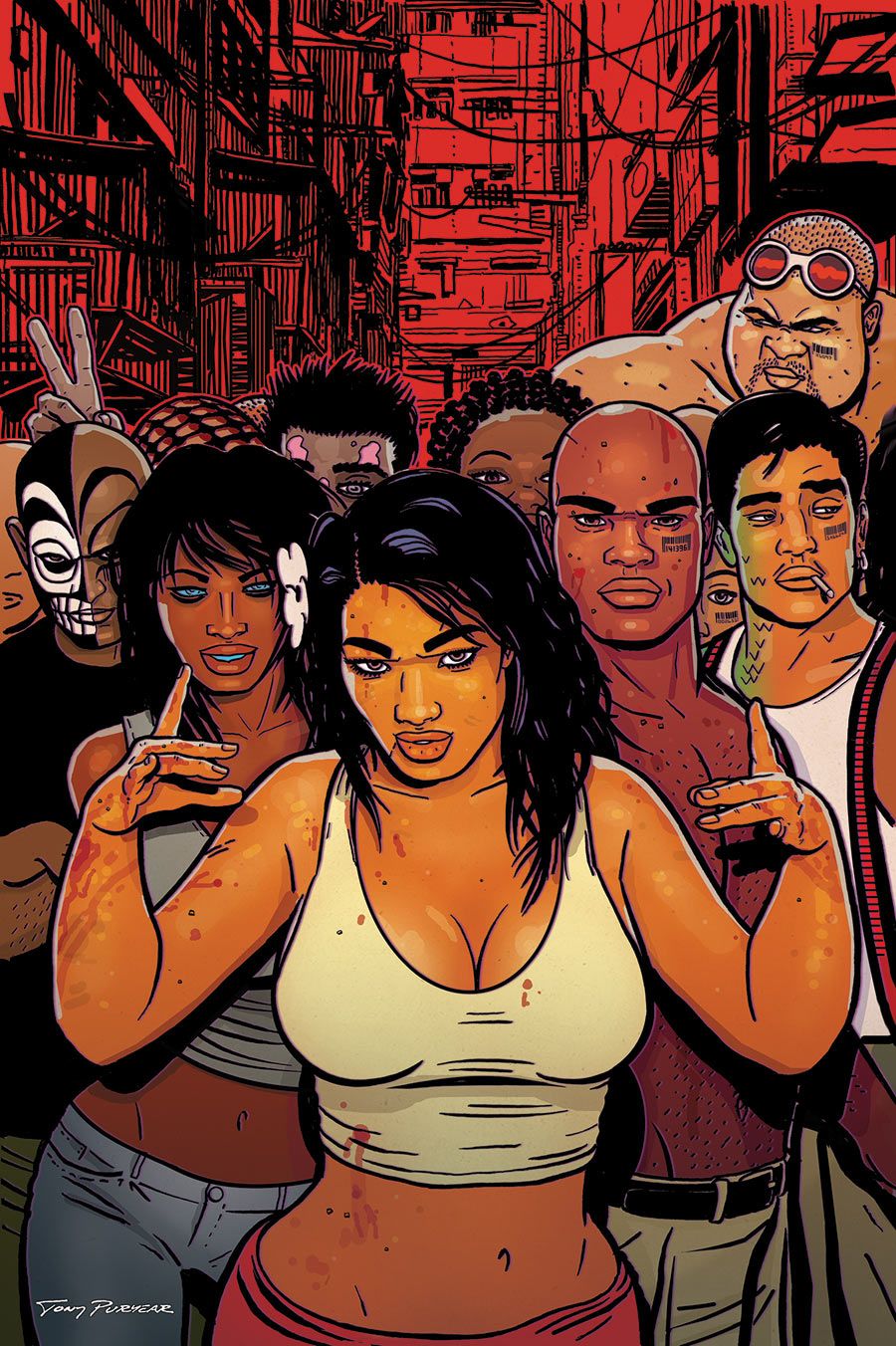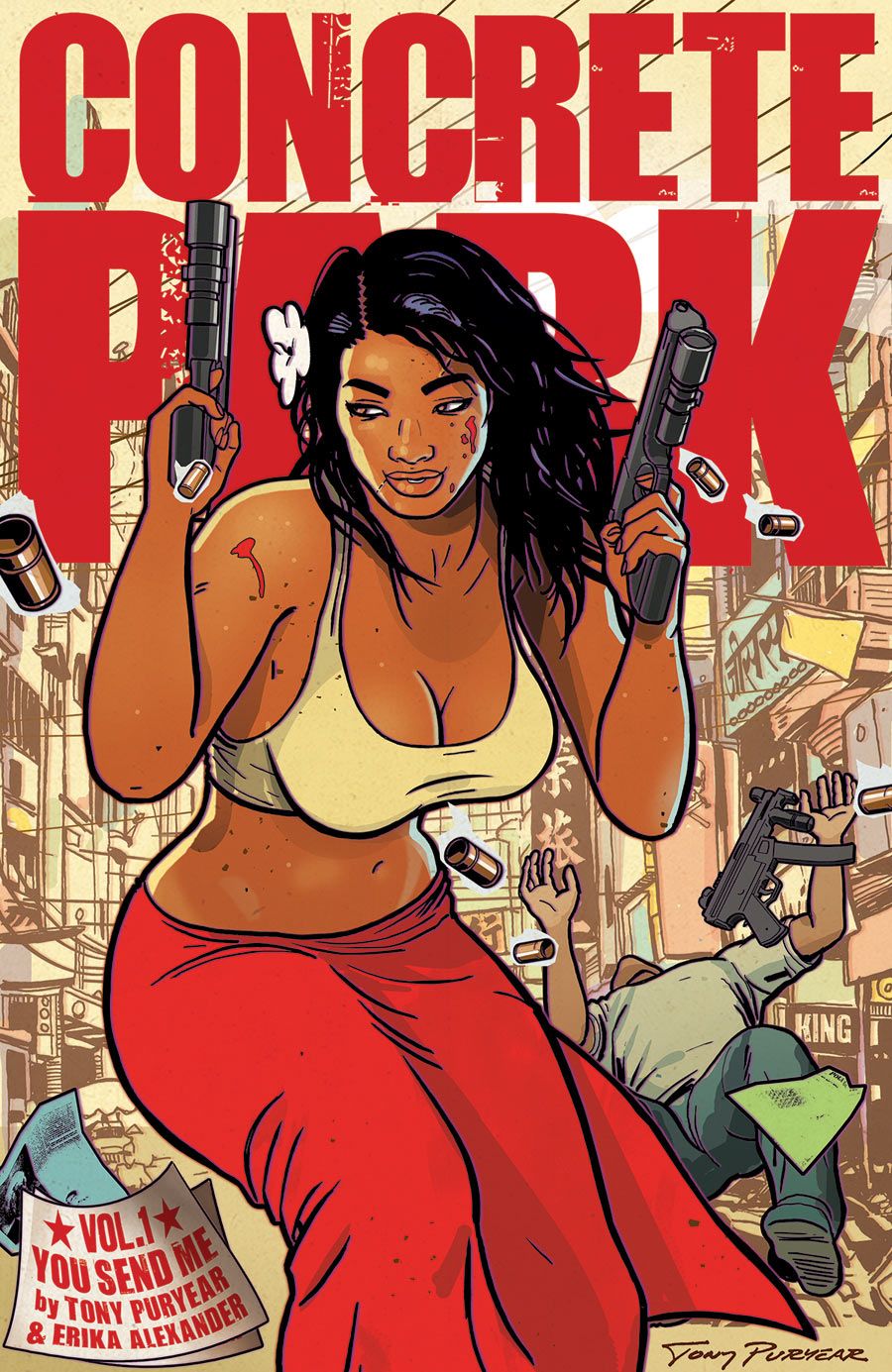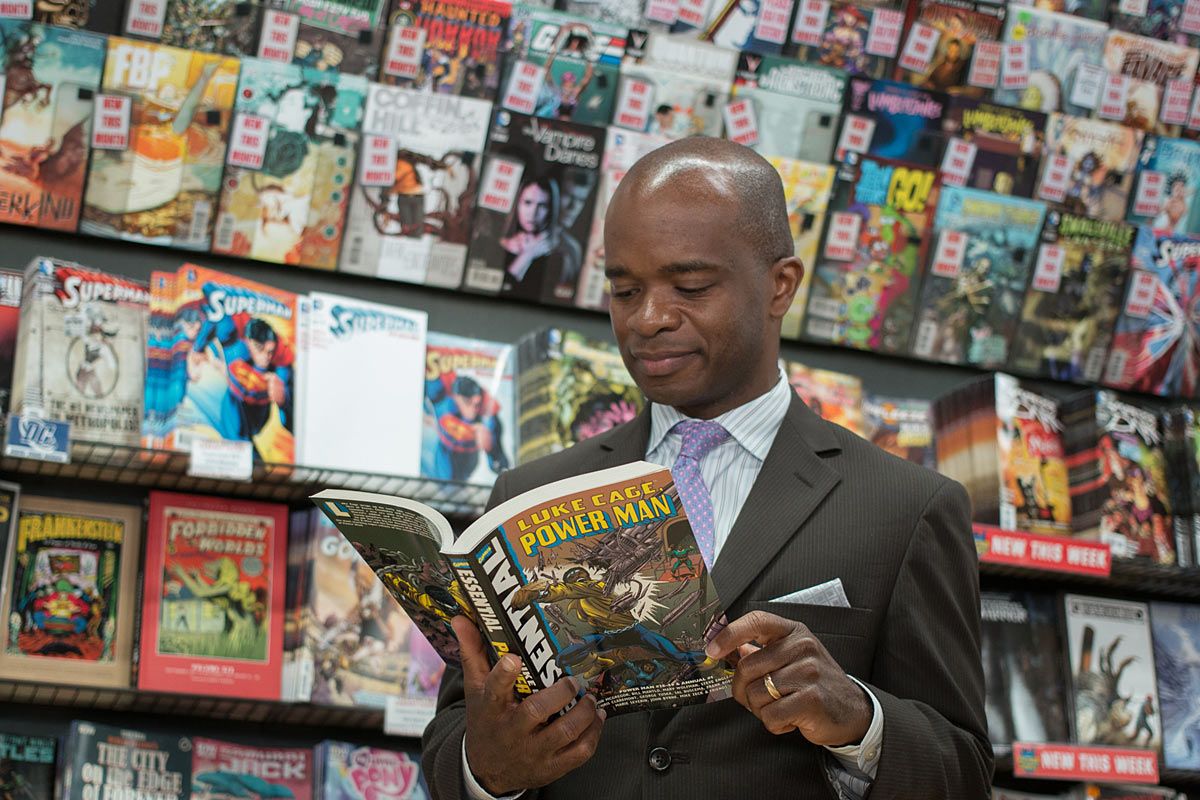Tony Puryear is the screenwriter behind "Eraser" with Arnold Schwarzenegger, and has written for the USA, MTV and Showtime networks.
Erika Alexander is the actress, writer, and activist whose work on the FOX sitcom "Living Single" earned her two NAACP Image Awards for Outstanding Actress in a Comedy Series.
Together, the married couple created the groundbreaking graphic novel series "Concrete Park" with Robert Alexander. Published by Dark Horse Comics, the second series collected edition, "Concrete Park: R-E-S-P-E-C-T" is scheduled for release May 6, 2015.
You may have heard about or read the story behind the fight to get "Concrete Park" to publication, but this is comics, so Tony and Erika have upped the ante with the illustrated story.

Joseph Phillip Illidge: The creation of "Concrete Park" is a story of empowerment, taking a situation into your own hands to shape a reality and narrative, one which is the exact opposite of the Hollywood narrative you were fed. The world of "Concrete Park's" Scare City can be viewed as a condensed form of the world defining for a person their few options in life, and identifying which masters must be served, or not served, at a cost.
Did "Concrete Park" turn out to be cathartic and get certain feelings out of your system?
Erika Alexander: It'sextremely satisfying to create a project that is unfiltered, not defined by the fear-economic-biased-corporate culture of Hollywood. Unfortunately, there are many parallel battles for us to face in the free-wheeling comic book world. That world can be liberating to different kinds of creators, but the dominant White-male fixation and bias we confront is there as well, and endures.

Tony, you took on the task of teaching yourself to draw so you could help ensure that "Concrete Park" would be realized as a graphic novel first, instead of prose. Now that the world has been fleshed out in two volumes, are you interested in other illustrators tackling "Concrete Park" stories that you, Erika, and Robert Alexander write, similar to how Vertigo's "Scalped" or "DMZ" series had series regulars and guest artists? Or do you see "Concrete Park" more like Image's "Saga" or "Velvet," in which there's a singular artistic approach?
Tony Puryear: Sure, in the long run, we'd love to have a series regular (me)andguest artists.While we like the look of the world we've created, there are artists out there who a) are so much faster than me and b) come with such a unique set of skills and perspectives that it would be a shame not to collaborate with them.
In the short run, though, I'm having so much fun making sure our"Concrete Park"characters and our world have a distinctive look and feel, I can't see giving it up any time soon. I get to be the Steven Spielberg of a world I helped create, not many people can say that, and I'm grateful to do this work I love.
Erika, since "Concrete Park" was, in and of itself, a way of proving that "editing" people of color from the future is ridiculous, did you feel an irresistible creative need to take that idea in the opposite direction and point out the same, regarding contemporary history, with your "Mad Men" script, "Uptown Saturday Night?"
Alexander: I didn't feel an irresistible creative need to do a "Mad Men" spec, but after reading an article quoting Matthew Weiner as not wanting to tell "...a wish fulfillment story of the real interaction of white America and Black America," I got inspired. He may be stymied, or think it historically inaccurate, but I knew better. I was curious to see what I could conjure up. Mostly, I wanted to put to bed the lie, and excuse, that the inclusion of people of color would be a forced error or, in Mad Men's case, problematic.
I approached the script like a rapper might make a new track, I "sampled" a bit of my father-in-law's life as a pioneering, Black liquor salesmen in the '60s in Manhattan. Then, using Matthew Weiner's notes, riffs and rules, I seamlessly incorporated a so-called "Black" narrative into his "White" story. I didn't see it as wish fulfillment, I saw it as a challenge of craft with a bit of research. I'm a beginner at all this, but I think I did the gig.
Did the "Mad Men" script turn out to be more of a means of getting the public primed for what was to come next from you, creatively and thematically?
Alexander: Priming the public? I wish I were that clever. Truth is, I had a little time on my hands and I thought I had a way in. Six weeks later...

 Since you both are well-established in film and TV, and now graphic novels, would you tackle another medium for future installments of "Concrete Park?" Maybe prose, for example, since the expansive world of "Concrete Park" lends itself to being done in multiple mediums at once.
Puryear: Like"Game of Thrones"creator George R.R. Martin, I grew up on the twin foundations of Robert E. Howard's "Hyborian Age" in his Conan stories, and Stan Lee and Jack Kirby's Silver Age Marvel Universe. Both of these worlds were elaborately built-out, fully believable places for a reader to inhabit and get lost in. Maps and diagrams were a key factor in this, (remember the Baxter Building?) as were Marvel's supplementary"Tales of Asgard"and"Inhumans"stories and Howard's"King Kull"tales.
As a screenwriter (and now as a comics creator), though, I'm usually tasked with keeping the action brief, fast-paced and in the here and now. In a 2-hour movie script or a 22-page comic, there's little time for backstory or history, but in so many fictional worlds we all love, that's where the good stuff is.
From our map to our glossary and gang guides, we've tried to build a rich and plausible fictive world in"Concrete Park's"Planet Oasis and Scare City, and our readers seem really engaged; they keep asking us for more. How did it get this way? When did the first humans arrive? Is this the first go-round for human settlement here or were there earlier, lost pioneers on Oasis? Where does Monkfish the shape-shifter come from? Strangely, or maybe not so strangely, our characters keep asking us for more, too: Where do I come from? What's my secret? We tell Monkfish to be cool, that we'll get to it, but we'd love the chance to answer some of these questions and really stretch out into one or more big ol' prose novels.
At the same time, we also cherish the idea that someday our story world will be the basis for a massive sandbox video game a la "Grand Theft Auto," where players can wander and explore forever. Of course, we'd also like to see"Concrete Park"as a binge-worthy scripted series or series of films.
We built "Concrete Park" with the idea that storytelling today is multi-platform, that while comics, games, prose novels, film and television overlap with each other to some extent, each of those platforms does something best. We want to hit all those notes. In the words of Chairman Mao, "Let one hundred flowers bloom," you know? And don't even get us started on the music -- all we can say is, stay tuned!
Joseph Phillip Illidge is a public speaker on the subjects of race, comics, and the corporate politics of diversity. In addition to his coverage by the BBC and Publishers Weekly, Joseph has been a speaker at John Jay College of Criminal Justice, Digital Book World's forum, Digitize Your Career: Marketing and Editing 2.0, Skidmore College, Purdue University, on the panel "Diversity in Comics: Race, Ethnicity, Gender and Sexual Orientation in American Comic Books," and at the Soho Gallery for Digital Art in New York City.
Joseph is the Head Writer for Verge Entertainment, a production company co-founded with Shawn Martinbrough, artist for the graphic novel series "Thief of Thieves" by "The Walking Dead" creator Robert Kirkman, and video game developer Milo Stone. Verge has developed an extensive library of intellectual properties for live-action and animated television and film, video games, graphic novels, and web-based entertainment.
His graphic novel project, "The Ren," about the romance between a young musician from the South and a Harlem-born dancer in 1925, set against the backdrop of a crime war, will be published by First Second Books, a division of Macmillan.
Joseph's newest comic book project is the upcoming Scout Comics miniseries "Solarman," a revamp of a teenage superhero originally written by Stan Lee.

